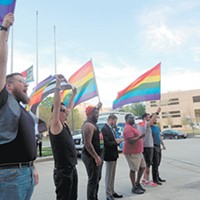This column was written by a columnist at our Greensboro-based sister paper YES Weekly in support of the now-infamous HB2. It does not reflect the opinions of YW's editorial staff. We have followed it with a response by Creative Loafing Charlotte's 'The Query' columnist Matt Comer.
Late last month the Charlotte City Council opened up a can of worms about how men and women use the can. Specifically its new ordinance would have allowed transgender persons to use public restrooms based on the gender with which they identify. The ordinance was to go into effect on April 1. In response, the North Carolina General Assembly met in special session last week and passed HB2, which, in effect, vacated the Queen City ordinance. Since then, a host of corporations, organizations, news agencies, columnists and elected officials have criticized HB2. Some have even threatened to punish our state with bans, boycotts, and relocation.
The NBA issued a statement on March 24 which implied that it might not hold its All-Star game in Charlotte next year unless HB2 is repealed. Meanwhile, Facebook, Apple, American Airlines, PayPal and other companies have publicly condemned HB2 with threats of moving their operations out of the state.
Adding fuel to the fire was Greensboro News & Record columnist Susan Ladd who wrote that passage of HB2 "conflicts with Title IX gender equity law, possibly risking $4 billion in federal education funds." And, the Associated Press reported that the new law will "deal a blow to the LGBT movement." The problem is that all of these knee-jerk threats and reactions are based on misinformation.
Governor McCrory told the News & Record, "I empathize with (transgender) people on this issue, but that doesn't mean that 99 percent of people have to adjust to empathize with a few people who are dealing with a very tough issue." McCrory was right. Charlotte City Council acted irresponsibly and demonstrated a brazen disregard for the privacy right of the so-called 99 percent.
Contrary to what Ms. Ladd opined, North Carolina is not necessarily at risk of losing $4 billion in federal education funds because at least one federal court has already ruled against such action in a similar case. And what about all of the companies lining up to say how appalled they are by HB2? Perhaps they should have read the bill more carefully before taking a stand. The fact is, HB2 allows private businesses and universities to accommodate transgender employees and customers in any way they so choose, and they can adopt any nondiscrimination policy they want. Moreover, HB2 allows private and public facilities to offer single-use bathrooms, where only one person (of any gender) can occupy the facility at a time. Also, HB2 places no restrictions on restrooms and locker rooms at privately owned sports facilities.
All of the heated rhetoric and misguided ill will about HB2 is unfortunate, but it could have been prevented if the transgender community hadn't been as combative as it's been recently. Parents of transgender students have largely been the driving force behind the movement's vitriolic campaign for unrealistic reforms when it comes to use of public facilities. When threatened with legal action by parents of so-called transgender students, school officials in Illinois, Colorado, Massachusetts and other states have tried to accommodate the needs of those students by offering any number of compromises, none of which were acceptable to the grandstanding parents.
LGBT advocacy groups in Charlotte and other cities have pushed their agenda on politicians who want to appear politically correct, but they've only gained traction when attaching their cause to those of gays, lesbians and bisexuals. Frankly, that act is wearing a bit thin. Over 65 percent of North Carolinians are reportedly opposed to biological men using women's restrooms. Gays and lesbians are in a constant struggle to obtain and retain their basic rights, like the right of same sex partners to marry, their right to adopt, their right to make medical decisions for each other and their right not to be discriminated against in the workplace.
In other words, gays, lesbians and bisexuals only want the same rights as everyone else — no special accommodations, no special privileges. Nor do gays and lesbians make demands that will inconvenience or otherwise violate the privacy rights of others. The same cannot be said of the transgender movement.
No doubt the North Carolina General Assembly is riddled with a few backward-thinking homophobes who will hopefully be replaced this fall, but threats from the transgender movement do nothing to advance the causes that are so crucial to a better quality of life for gays, lesbians and bisexuals. That's why it's time for the LGBT movement to jettison the "T" from their name, and focus on their singular cause, which should not be encumbered by the intrusive demands of persons who are no longer comfortable with their own gender.

